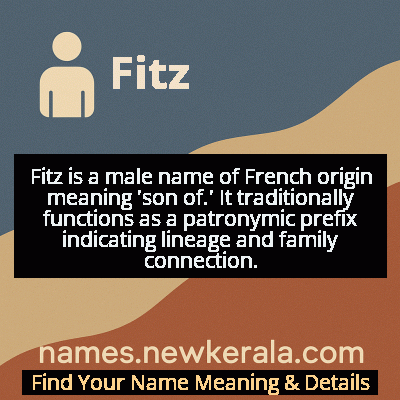Fitz Name Meaning & Details
Origin, Popularity, Numerology Analysis & Name Meaning of Fitz
Discover the origin, meaning, and cultural significance of the name FITZ. Delve into its historical roots and explore the lasting impact it has had on communities and traditions.
Name
Fitz
Gender
Male
Origin
French
Lucky Number
7
Meaning of the Name - Fitz
Fitz is a male name of French origin meaning 'son of.' It traditionally functions as a patronymic prefix indicating lineage and family connection.
Fitz - Complete Numerology Analysis
Your Numerology Number
Based on Pythagorean Numerology System
Ruling Planet
Neptune (Ketu)
Positive Nature
Intuitive, analytical, spiritual, and inquisitive.
Negative Traits
Secretive, reserved, aloof, and can be overly critical.
Lucky Colours
Green, yellow.
Lucky Days
Monday.
Lucky Stones
Cat’s eye, moonstone.
Harmony Numbers
1, 5, 6.
Best Suited Professions
Scientists, researchers, spiritual leaders, detectives.
What People Like About You
Depth of knowledge, analytical skills, spirituality.
Famous People Named Fitz
Fitzwilliam Darcy
Literary Character
Iconic romantic hero in Jane Austen's 'Pride and Prejudice'
Fitz Hugh Lane
Artist
Renowned American Luminist painter and marine artist
Fitz-Greene Halleck
Poet
Celebrated American poet and member of the Knickerbocker Group
Fitzroy Somerset
Military Leader
British Field Marshal and 1st Baron Raglan
Name Variations & International Equivalents
Click on blue names to explore their detailed meanings. Gray names with will be available soon.
Cultural & Historical Significance
Throughout medieval England, Fitz names became markers of noble lineage and royal connections, often indicating descent from prominent Norman families who settled in England and Ireland. The prefix carried both prestige and a hint of scandal, as it frequently identified children born outside marriage to royal fathers. This dual nature—honoring paternal lineage while acknowledging irregular birth—gave Fitz names a unique social standing that persisted through centuries of British and Irish history.
The cultural impact extended to literature and aristocracy, where Fitz characters often represent complex identities balancing heritage and individual merit. This historical background continues to influence how the name is perceived today, carrying echoes of medieval nobility, romantic literature, and the enduring human themes of identity and legacy.
Extended Personality Analysis
Individuals named Fitz are often perceived as possessing an air of aristocratic confidence and intellectual depth. They tend to exhibit strong leadership qualities, refined manners, and a natural authority that commands respect. The historical connection to nobility lends an expectation of dignity, strategic thinking, and the ability to navigate complex social situations with grace and diplomacy.
Fitz personalities typically demonstrate loyalty to family traditions while maintaining independent thinking. They often balance traditional values with modern perspectives, showing adaptability without sacrificing core principles. There's frequently a creative or artistic streak present, combined with analytical abilities that make them effective problem-solvers. The name suggests someone who carries themselves with quiet assurance rather than overt arrogance, valuing heritage while forging their own path.
These individuals are often seen as bridge-builders—connecting different worlds, ideas, or people through their diplomatic skills and broad perspective. They tend to be perceptive judges of character with a strong sense of justice, though they may sometimes struggle with the weight of expectations associated with their distinguished-sounding name. Ultimately, the Fitz personality combines heritage awareness with forward-thinking innovation.
Modern Usage & Popularity
In contemporary times, Fitz has evolved from primarily a surname prefix to a distinctive given name, particularly popular in English-speaking countries. It's experiencing a revival as parents seek unique yet historically grounded names with aristocratic flair. The name appeals to modern sensibilities by being both traditional and unconventional—familiar through historical and literary associations yet distinctive enough to stand out. Current naming trends show Fitz gaining popularity as a first name, often chosen by parents who appreciate its British heritage, literary connections (particularly through Jane Austen's Fitzwilliam Darcy), and the sophisticated, slightly rebellious image it projects. It's particularly favored in the United States and United Kingdom among families seeking names with depth and character, often used as a standalone name rather than part of a longer compound name.
Symbolic & Spiritual Meanings
Symbolically, Fitz represents lineage, heritage, and the complex interplay between legitimacy and identity. It embodies the concept of carrying forward family legacy while establishing individual worth. The name suggests bridging worlds—connecting past and present, tradition and innovation, established order and personal merit. Metaphorically, Fitz signifies the idea that one's value comes not from circumstances of birth but from character and achievements.
The name carries deep symbolic weight as a marker of transformation and self-definition. It represents the journey from inherited identity to earned reputation, symbolizing how individuals can transform perceived disadvantages into strengths. Fitz embodies the paradox of honoring origins while transcending limitations, making it a powerful symbol of personal agency within the context of family and social structures. The name ultimately suggests that true nobility comes from within, regardless of one's starting position in life.

